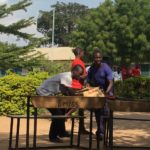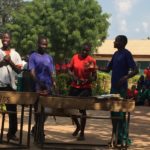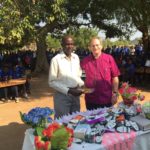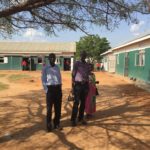[Note: Click the images below for larger versions]
Sunday is definitely the Lord’s Day in Uganda. Churches are everywhere and, especially in Pentecostal congregations, worship begins on Saturday night with loud prayer and praise that goes into the wee hours of Sunday morning.
I know because one such church is located about fifty yards from my bedroom.
I love the African Church, but by 2 a.m. on Sunday, I have grown weary of their fondness for powerful sound-systems hooked up to electronic keyboards. You can be in a church the size of a large living room, and invariably there are two huge speakers at the front; the preacher uses a microphone, even though you could easily hear him without one. And electronic keyboards accompany everything. Why? I ask as I put a pillow over my ears. In Teso, there are native instruments— drums, wood-flutes, and especially the edugu, a kind of lyre that comes in varying sizes and demands a high level of skill— which are perfectly suited to the soft, rich, polyphony characteristic of the people’s choral singing. Even better is when they sing with no accompaniment at all— Iteso choirs would rival the Welsh. One of the most moving Sundays of my life was spent in a huge church in Soroti when the electricity went out, and the whole service had to be sung a cappella.
But then, there are times when I think the speakers and the keyboards and the microphones are exactly right. Worship with the children and staff at Beacon of Hope College is one of those occasions.
The morning service begins at 8:00. Our “church” there is a large open area under an ancient fig tree. This is the very center of the school, and it is literally holy ground. Here, the electronic media are all helpful— first, because with more than five hundred people in the open air, words get lost without a microphone and a serious speaker system; second, because they give the kids an added sense of their own dignity and power in the Lord. The choir (which is huge) dance as they sing.The students lead all the praise music and most of the worship. Their devotion is palpable. Some of them are already skilled preachers, and the prayer of the young leaders is spontaneous, wise, and brief. I am always humbled by these kids. I think I always learn from them more than I teach.
I will be teaching momentarily.
I have been thinking about this sermon since an incident the previous afternoon during our visit to the ajono group in Pamba. One of the members said that the group was a good place to bring your problems, and get some input from your friends. I asked, what kind of problems? He replied, Oh, anything, business, family issues, anything. Then he thought a moment and said, But you must be careful. You bring these guys problems with your family, your wife, they may help you while you are here, but they will laugh at you when you are gone.
So, today, I am preaching on shame.
After the usual introductions, songs and prayers, there is a skit by the students about a kid who discovers the advantages of stealing. He and a friend lift the school television, sell it, and find it all so easy, they start stealing kitchen equipment, until they are finally caught and thrown out of school. The students howl with delight. After this, I am presented as the preacher. Talk about a hard act to follow!
I start by telling the children how proud I am of them, that they are always on my heart. I am proud of their accomplishments, but also for their courage in just being here. I and proud of the ones who are at the top of the class, and I am just as proud of those who struggle to get the grades they get.
Because that is how God loves us: without distinction. We draw distinctions all the time. We think there are big sinners and little sinners, for example, that some people are worse than other. For example, I ask them, who are the biggest sinners in Uganda? A few people whisper suggestions I can’t hear; then one girl puts her hand up and says clearly, Parliamentarians! The whole assembly laughs. Oh, I say, just like in the U.S.! They laugh again. But that is not how Jesus thinks, I continue. Saint Paul says, all have sinned and fall short of the glory of God. We have all sinned, and yet God looks at us all with the same love.
They have just heard read Matthew 9: 9-13, the call of Matthew the tax collector, who follows Jesus, then endures humiliation from the Pharisees, who ask the disciples why their Master eats with such scum. I say that shame is a feeling before it is a thought: your ears get hot, your eyes water, you have a lump in your throat and ice in your stomach. You look down because you cannot bear to look up. I ask, how many of you have known this feeling? They all raise their hands.
Yes, we all have known this. But Jesus is the end of shame. Look at how He loves Matthew. He answers the Pharisees this way: Those who are well have no need of a physician, only those who are sick. He knows, of course that the Pharisees are as ill because of sin as anybody else, but they are even worse off because they think they are not ill at all. They are only able to walk around feeling righteous because they have the power to shame everyone else, to displace their own darkness onto others, like prostitutes and tax collectors. In effect they sacrifice other human beings so they can feel good about themselves. That is why Jesus says to them, Go and learn what this means: I desire mercy, not sacrifice (Hosea 6:6). For I came not to call the righteous, but sinners. It is Jesus who has made the one necessary and acceptable sacrifice, taking all our shame upon Himself. From now on we can walk before God and in the world without fear of condemnation. We are called to repent, but thanks to the Cross of Christ we have no need to be ashamed, and no need to shame others. I ask us all to trust God who will help us walk in the world with open hearts, bringing Jesus’ own mercy and love to all God’s children without distinction.
After the sermon and more prayers, there is an offertory, and I get to empty my “Wilkinsburg Bags.” Hundreds of crayons and pencils pour out onto the table, and are received by the Deputy Head Teacher. We share the grace all around, and as we do so, many students come to talk to me. One puts a note in my hand and walks off quickly. When I read it I am nearly moved to tears.
We finish the morning with a tour around the campus: the new girls’ dormitories are finished, fully secure, now. For years, the kids slept in rented quarters outside the perimeter of the school; but now they are completely safe, though I am still alarmed at how crowded the conditions are.
Nearly all of them live in similarly close quarters in their villages, however, sharing a hut with parents and several siblings. There is such a spirit of joy here, and I notice a new sense of confidence as well, especially among the girls, of their own dignity and power in the Lord.
And if electronic keyboards and huge speakers can help them grow that sense of dignity and power, even just a little, then I am all for it!





